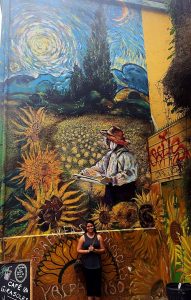J-Term Practica, 2016
Education on Injustice and Chile’s Vulnerable Populations
March 1, 2016

I chose to partake in Dr. Jan Black’s “Transitional Injustice and Chile’s Vulnerable Populations” course this January in order to do a directed study focusing on the methods used to educate the global community about the injustices in Chile. Despite frequently discussing short-term study abroad programs in my courses as an International Education Management t M.A. student, I had never participated in a short-term abroad program, nor had I partaken in an abroad program primarily in a language I do not speak. Both short-term programs and language learning are prevalent topics in my field, so the course seemed like a good opportunity to get a firsthand perspective.
I also chose this program because of my lifelong interest in Indigenous communities. I grew up in an area where Indigenous history and pride is visible daily, but where Indigenous issues in the present are often turbulent. I spent much of my childhood wishing I could participate in the Indigenous activities surrounding me, and much of my undergraduate career was focused on North American Indigenous rights, art, and repatriation. I took Dr. Madjidi’s “Indigenous Ways of Knowing” course this past semester, a realized that I could not afford to miss the opportunity to learn from Dr. Black, Judge Juan Guzman, and the community members we met with.
During our time in Chile I noticed many parallels between the injustices in Chile and those in the U.S. From the spreading of disinformation to the trauma suffered, many factors in both locations make these things difficult for people to talk about. Yet, it is often this lack of accurate information that makes these issues so difficult to teach. In Chile, many of these issues surround the dictatorship of Augusto Pinochet and the struggles of Indigenous communities, like the Mapuche. Some people would rather not talk about it, and instead hope that future generations will learn about it in school. Others don’t talk about it because the memories are too personal and too difficult. Internal conflicts within communities are making it difficult for communities to work
together, and many of these people feel that they are owed a debt that can’t be paid back. Simultaneously, there are others who would prefer to erase the past or deny its existence. From this course I realized that, with this polarization both Chile and the U.S. are missing a way to collectively think about their futures. These issues are constant battles keeping each country from being able to move forward. And as such, we are each unable to work on our futures because we haven’t worked through our past.
While in Chile I also realized how much more of a focus we should all have on
intercultural competency. At MIIS the ICC courses were already my favorite, but in Chile I realized that in many situations my ICCs are also my most important skill set. All of our intercultural competencies were tested on this course, and I witnessed first-hand how difficult it can be in practice to truly relate to others when fundamental beliefs differ. I really appreciate having been through this, having felt tested, and feeling more confident than ever about my abilities to work with people with different sets of values.
On an academic level, I feel very similar to the way I felt before this course in terms of the importance of short-term study abroad opportunities and language instruction. I am proud of the work that Dr. Black and Lejla Mavris do, an d even more proud of my degree and the critical skills we learn in the International Education Management program. In the future, I hope to see more collaboration between IEM classes on campus and the preparation for J-Term courses being offered.
On a more personal level, I came back from Chile feeling rejuvenated and encouraged to learn more from the Indigenous people in my community. This course solidified that Indigenous rights are an issue that will continue to be close to my heart and something that I will keep fighting for.




You must be logged in to post a comment.